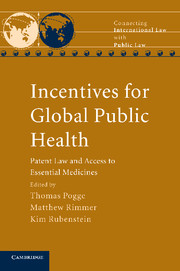Book contents
- Frontmatter
- Contents
- Contributors
- Series Editors' Preface
- Editors' Preface
- Introduction: Access to essential medicines: public health and international law
- Part I International trade
- Part II Innovation
- 5 The Health Impact Fund: better pharmaceutical innovations at much lower prices
- 6 The Health Impact Fund: a critique
- 7 A prize system as a partial solution to the health crisis in the developing world
- 8 Innovation and insufficient evidence: the case for a WTO–WHO Agreement on Health Technology Safety and Cost-Effectiveness Evaluation
- Part III Intellectual property
- Part IV Healthcare
- Bibliography
- Index
7 - A prize system as a partial solution to the health crisis in the developing world
Published online by Cambridge University Press: 04 August 2010
- Frontmatter
- Contents
- Contributors
- Series Editors' Preface
- Editors' Preface
- Introduction: Access to essential medicines: public health and international law
- Part I International trade
- Part II Innovation
- 5 The Health Impact Fund: better pharmaceutical innovations at much lower prices
- 6 The Health Impact Fund: a critique
- 7 A prize system as a partial solution to the health crisis in the developing world
- 8 Innovation and insufficient evidence: the case for a WTO–WHO Agreement on Health Technology Safety and Cost-Effectiveness Evaluation
- Part III Intellectual property
- Part IV Healthcare
- Bibliography
- Index
Summary
Introduction
Each year, roughly nine million people in the developing world die from infectious diseases. Millions more endure suffering caused by the same diseases. Many of those deaths and much of that pain could be avoided by modifying the combination of laws and government programmes that provide incentives for the development and distribution of drugs. In a recent paper, we argued that such modifications are morally imperative, despite the fact that they would increase the already substantial extent to which the cost of developing new drugs is borne by the residents of the developed world, either by raising their taxes or by increasing the prices they pay for patented pharmaceutical products.
The difficult question, in our judgment, is not whether we should modify our laws and institutions to address this crisis, but which combination of reforms would alleviate the problem most fairly and efficiently. We are currently working on a book that examines and compares a wide variety of potential solutions. In this chapter, we focus on one option: replacing or supplementing the patent system, as the main method by which we encourage the creation of new drugs, with a system of government prizes.
Producing new pharmaceutical products – and then verifying their effectiveness and safety – is both expensive and risky. Substantial financial incentives are essential to induce firms to engage in this activity.
- Type
- Chapter
- Information
- Incentives for Global Public HealthPatent Law and Access to Essential Medicines, pp. 181 - 208Publisher: Cambridge University PressPrint publication year: 2010
- 3
- Cited by



